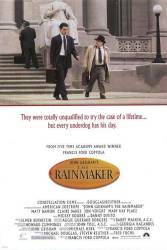Visible crew/equipment: When Deck Shifflet (played by Danny DeVito) and another actor are calling their office from a payphone, in order to setup another law firm, once the call has been completed and there is some back and forth between the Danny and the other actor, a crew member is entering the scene via a side alley, more humorous is how said crew member leaves the scene, on realizing that he has just walked onto a live set, the crew member proceeds to stop and walk in reverse out of shot. (01:13:57)

The Rainmaker (1997)
1 visible crew/equipment mistake - chronological order
Directed by: Francis Ford Coppola
Starring: Matt Damon, Jon Voight, Mickey Rourke, Claire Danes
Continuity mistake: When Rudy comes to the Black's place the first time and Donny Ray's nose starts bleeding, blood drops on the letter in which Great Benefits deny their claim for the eighth and last time, calling Dot Black "stupid, stupid, stupid". The letter dates from April 25, 1995 and is signed by Russell Krokit. When the same letter is produced as evidence when Everett Rufkin is heard as a witness the letter dates from July 7, 1994 and is signed by Everett Rufkin with copy to Russell Krokit. (00:10:50 - 01:17:30)
Rudy Baylor: Sworn in by a fool and vouched for by a scoundrel. I'm a lawyer at last.
Question: I have two questions.1. Why would it be important, as Leo Drummond says, that his objections have to be noted, even after they are overruled? 2.After Rudy was finished with the C.E.O., Leo Drummond is allowed to ask the C.E.O. some questions, what good does it do to say that he rests on his objections?
Answer: 1) A lawyer has only to object one time and it be acknowledged by the judge to preserve his right of appeal related to a given legal ruling. He might choose to object a second time in order to eliminate the highly unlikely possibility that the court reporter misheard and inaccurately recorded his first objection and/or it being overruled. 2) The CEO had just been destroyed on direct examination by the plaintiff's lawyer, Rudy, to the point where no questions Drummond might ask had any chance of rehabilitating his client's testimony, and so he passed on asking any questions. Saying, "No questions, your honor, as we instead rely on our earlier objections", Drummond was making a somewhat feeble attempt to imply to the jury that the reason he wasn't asking any questions wasn't because he didn't have any that could help his case, but it was actually because they should not have been allowed in the first place. It was weak, but it was all he had under the circumstances.
Join the mailing list
Separate from membership, this is to get updates about mistakes in recent releases. Addresses are not passed on to any third party, and are used solely for direct communication from this site. You can unsubscribe at any time.
Check out the mistake & trivia books, on Kindle and in paperback.




Answer: 1) Having his objections noted into the court records would make it easier if the defense decides to appeal the verdict, allowing counsel to cite what aspects of the trail he felt were mishandled. 2) Having him repeat his objections after cross-examining the CEO reminds the jury that Drummond felt it was inappropriate to use stolen documents as evidence in the case, perhaps generating some sympathy.